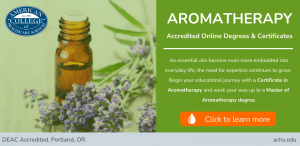
One of the most frequently asked questions I hear from ACHS students, graduates, and aroma-enthusiasts is: How do I become a Registered Aromatherapist (RA)?
As you may already know, an RA is an aromatherapist who has successfully demonstrated a core body of aromatherapy knowledge by passing the Aromatherapy Registration Council’s (ARC) Examination. The ARC RA Examination’s primary focus is the safe administration of essential oils and covers topics such as scientific principles, administration, and professional issues in aromatherapy. It is also available in a number of languages, including English, Japanese, and Korean. In mid-2015, it will be available in Chinese.
Once you have successfully passed the ARC RA Examination, you are added to the online international database of ARC Registered Aromatherapists. The RA registration (which is valid for five years) confirms your high standard of aromatherapy education and demonstrates a commitment to the ethical, safe use and administration of essential oils when working with the public.
An additional perk: the ARC will also verify your registration status at the request of employers, government agencies, and anyone who needs to verify your professional qualifications.
But how do you become a Registered Aromatherapist (RA)? Here are 10 essential steps to take to become a Registered Aromatherapist:
Step 1 – Ask Yourself: Am I Qualified to take the ARC Exam?
The very first step before applying for any credential is to ask one simple question: do I meet the qualifications? All students, including international students, can sit for the ARC RA Examination if they:
- Complete a minimum of 200 hours in a Level II or III aromatherapy program that is in compliance with the current National Association for Holistic Aromatherapy (NAHA) or Alliance of International Aromatherapists (AIA) Educational Guidelines or provide evidence of equivalent training (be sure you include your transcripts and/or syllabi in your application). If you are not sure that your school’s curriculum is covered in the “core body of knowledge,” download the ARC’s Candidate Handbook. You can also encourage your school or aromatherapy training institute to submit final examination questions confidentially to Professional Testing Corporation (PTC) who oversee the exam administration and management.
- Agree to adhere to the full Disciplinary Policy
- Complete and file the Application for ARC Registration Examination in Aromatherapy
- Pay the required fees
Step 2 – Check the Upcoming Application and Examination Dates
Next, you’ll want to make sure you’ve marked the upcoming Application Deadlines and Examination dates on your calendar. The ARC has these dates listed on their website here: http://aromatherapycouncil.org/?page_id=86.
Step 3 – Download the Candidate Handbook
The Candidate Handbook is a must-have resource when preparing for the ARC Exam. You can download your copy from the PTC’s website here.
The Candidate Handbook will help you understand:
- The ARC’s mission
- How to apply to take the Exam
- How the Exam is scored
- How you will receive your results
- The content of the Exam
- Instructions for re-taking the Exam
- Fees and refunds
- How to schedule your Exam appointment
- Plus it will give you examples of Exam questions!
Step 4 – Study and Prepare for the Exam
Once you’ve reviewed the Candidate Handbook, you’ll have a good idea of what to expect on the Examination. From there, you can continue to study the relevant course materials you’ve saved from your Level II or III aromatherapy program. You can also check out the recommended reading on page 10 of the Candidate Handbook.
The ARC Examination is a computer or a paper-and-pencil examination (with a score of 70% or higher to pass) composed of a maximum of 250 multiple choice questions with a total testing time of four hours. Need some practice questions? Don’t forget to utilize the sample questions in the Candidate Handbook.
The content of the Exam will be weighted approximately based on the following topics:
I. Basic Concepts of Aromatherapy…………………………. 20%
II. Scientific Principles……………………………………………. 30%
III. Administration ………………………………………………….. 35%
IV. Professional Issues ……………………………………………. 15%
As an educator, I know studying takes a lot of time and energy. Don’t forget to maintain your health and wellness while preparing for the Exam:
- Take a 10 minute break for every hour of study time
- Reward yourself for a good study session
- Diffuse your favorite invigorating essential oils in your study space (I love rosemary Rosmarinus officinalis (L.) and bergamot Citrus aurantium (L.) var. bergamia)
- Maintain balanced, holistic nutrition
- Drink plenty of water—hydration is good for the brain!
Step 5 – Fill Out Your Application and Pay Required Fees
There are three documents you’ll need to complete your application (the Application and Consent form can be found in your Candidate Handbook):
- ARC Disciplinary Policy (you must agree to this policy on your application)
- Application for ARC Registration Examination in Aromatherapy, mark the language you prefer, English, Japanese, or Korean (the Japanese and Korean exams are only paper-and-pencil based)
- Candidate Consent Form
Reminder: Don’t forget to include your transcripts and/or syllabi from your Level II or Level III aromatherapy program.
The application fee for the exam is $325. You have a few options when paying your exam fee. You can:
- Pay by check or money order: Make payable to: PROFESSIONAL TESTING CORPORATION and include in your application packet.
- Pay by card: Visa, MasterCard, and American Express are also accepted, and you can complete the Credit Card Payment section on the Application.
DO NOT send cash—be sure to pay through one of the two options listed above.
Step 6 – Send In Your Application
Once you’ve completed your application, it’s time to send it in. Complete your application online or mail your application to PTC at this address:
Professional Testing Corporation
1350 Broadway, 17th Floor
New York, NY 10018
The next ARC application deadline is March 1, 2015, so it’s time to begin gathering your materials and preparing for the Examination (as I mentioned above, the upcoming dates can be found here: http://aromatherapycouncil.org/?page_id=86).
Step 7 – Sit for Your Exam
Now it’s time to take your exam! Once you’ve submitted your application, PTC will contact you within six weeks with an Eligibility Notice.
The Eligibility Notice will tell you how to schedule your examination appointment, and it will also remind you of the available exam dates. The ARC Examination is offered during an established two-week testing period, Monday through Saturday, excluding holidays. You may have different instructions if you are taking the paper-based exam in Japanese or Korean, so be sure to read your Eligibility Notice carefully.
Remember: Exam appointment times are first-come, first-served, so schedule your appointment as soon as you receive your Eligibility Notice. This will increase your chances of being able to take the exam at your preferred location and time. To find a testing center near you, visit www.ptcny.com/cbt/sites.htm or call PSI Exams Online at (800) 733-9267.
Once you’ve scheduled your appointment, PSI will send you a confirmation email with the date, time, and location of your exam. Be sure to review this information carefully, and contact PSI immediately if you notice any errors.
Remember to plan accordingly on the day of your exam: The exam is proctored and you are not permitted to leave the room (even for a toilet break!), so be prepared. You are not permitted to take any paper, books, or iPhones into the examination room.
Be sure to get plenty of sleep the night before, drink lots of water, eat a nutritious breakfast, and allow for adequate travel time so you arrive at your examination center on time and ready to succeed! Don’t try to “study crunch” the night before. If you’ve taken the time to study in the weeks leading up to the exam, you’re already set up for success.
Step 8 – Receive Your Exam Grades and Registry Notification
Once you have completed your exam it will be sent to PTC for grading. If you’ve successfully passed the exam, PTC will notify the ARC that you are successful candidate (congratulations!). The ARC will then prepare a Registration Certificate and update the Register. This process can take four to six weeks.
If you’ve passed the Exam, your test results and your Registration packet will be mailed to you. As a successful registrant, make sure to email the ARC to confirm any details you would like listed on the Register. The ARC will automatically list your name and address, but you can also request to have your website, phone number, and email included on your listing.
You can find the current listing of Registered Aromatherapists (RA) here: http://aromatherapycouncil.org/?page_id=88. Remember, as a Registered Aromatherapist, you are responsible for ensuring your information on the Register is accurate and up-to-date. If your information changes you will find the form to submit updates here http://www.ptcny.net/clients/ARC/RA/Member/DisplayRA.aspx
As I mentioned above, one perk of passing the Examination and becoming an RA is that the ARC will verify your registration status at the request of employers, government agencies, the public, or anyone with whom you wish to share your new credential.
The ARC will only release your RA status, the date your registration was awarded, and any disciplinary actions taken by the ARC.
Step 9 – Utilize Your New RA Credential!
Now that you are a Registered Aromatherapist (RA), you have many options for putting your new credential into action. As an RA, you can…
- Teach clients how to achieve and sustain good health on a daily basis by incorporating essential oils into their life, and share other natural modalities to supplement their healthy lifestyle if you have the training.
- Empower clients to achieve improved health through addressing any imbalances caused by a lack of quality sleep, adequate pure water, exercise, fresh air, and relaxation.
- Help clients to evaluate their lifestyle choices to identify and change any potential causes of ill health and create a wellness plan.
But remember, unless you have previous qualifications and training as a Registered Aromatherapist (RA), you are not a licensed physician. You must be vigilant and aware of the current legislation in your state on the practice of aromatherapy.
Here are a few basic things that an RA cannot do:
- Diagnose disease. An aromatherapist will always refer clients back to their primary care physicians for a diagnosis if necessary.
- Treat disease. An aromatherapist’s focus is on health and education, not on disease.
- Prescribe drugs or pharmaceuticals. Aromatherapists teach clients about essential oils.
- Perform invasive procedures. Depending on training and licensing, a natural health practitioner may use hands-on techniques, like reflexology.
- Practice unsafe administration techniques such as Raindrop Therapy or Raindrop Technique.
Step 10 – Maintain Your Credential with Continuing Education
Now that you have your RA credential, it’s important to meet the continuing education requirements. Here are a few things to remember in order to maintain eligibility as a Registered Aromatherapist (RA):
- Registration is recognized for a maximum period of five years.
- To maintain Registration, you must be in compliance with the ARC Disciplinary Policy.
- You must also be in compliance with other ARC standards, policies, and procedures.
After five years, you can…
- Either retake and pass the then-current Registration Examination or meet continuing education requirements (see information below).
- All RAs are responsible for maintaining continuing education records used for the Application.
- Complete the renewal form.
- List all continuing education activities.
- Pay the $325 renewal fee.
- Download your Reregistration Application here: http://www.ptcny.com/clients/ARC/#Reregistration%20Information
To remain eligible for RA registration with continuing education requirements, remember that:
- 100 contact hours are equal to 100 actual continuing education hours.
- Hours must be provided by any approved educational body or organization, or by a NAHA- or AIA-approved school or educator.
- Training in Raindrop Therapy or Raindrop Technique does not count as this is not approved as a safe administration method by ARC.
Here are some options for completing your continuing education requirement. All events must be related to aromatherapy:
- Workshops
- Seminars
- Professional development offerings
- Online or on-campus courses
- State or national conferences
- The preparation and presentation of a professional education topic relevant to aromatherapy
- An original article written by the candidate and published in a professional journal such as the International Journal of Professional Holistic Aromatherapy (IJPHA)
Aromatherapists have been taking the Registration Examination since its inception, and the number of Registered Aromatherapists (RA) continues to grow, even spreading across the globe. There are RAs in China, France, Hong Kong, Singapore Japan, Korea, and the United States.
Here at the American College, students from all over the world have successfully completed their ACHS aromatherapy program and passed the ARC Examination and received the “RA” distinction. In fact, ACHS Aromatherapy graduates have a 100% success rate over five-years (2009-2013).
There are tremendous benefits to becoming a Registered Aromatherapist (RA). This credential helps reinforce a standard of excellence and safety in the profession of aromatherapy, and I am encouraged that more and more aromatherapists join the registry each year.
Do you have questions about the ARC or the Exam? Ask me in the comments!
This article is for informational purposes only. It is not intended to treat, diagnose, cure, or prevent disease. This article has not been reviewed by the FDA. Always consult with your primary care physician or naturopathic doctor before making any significant changes to your health and wellness routine.





